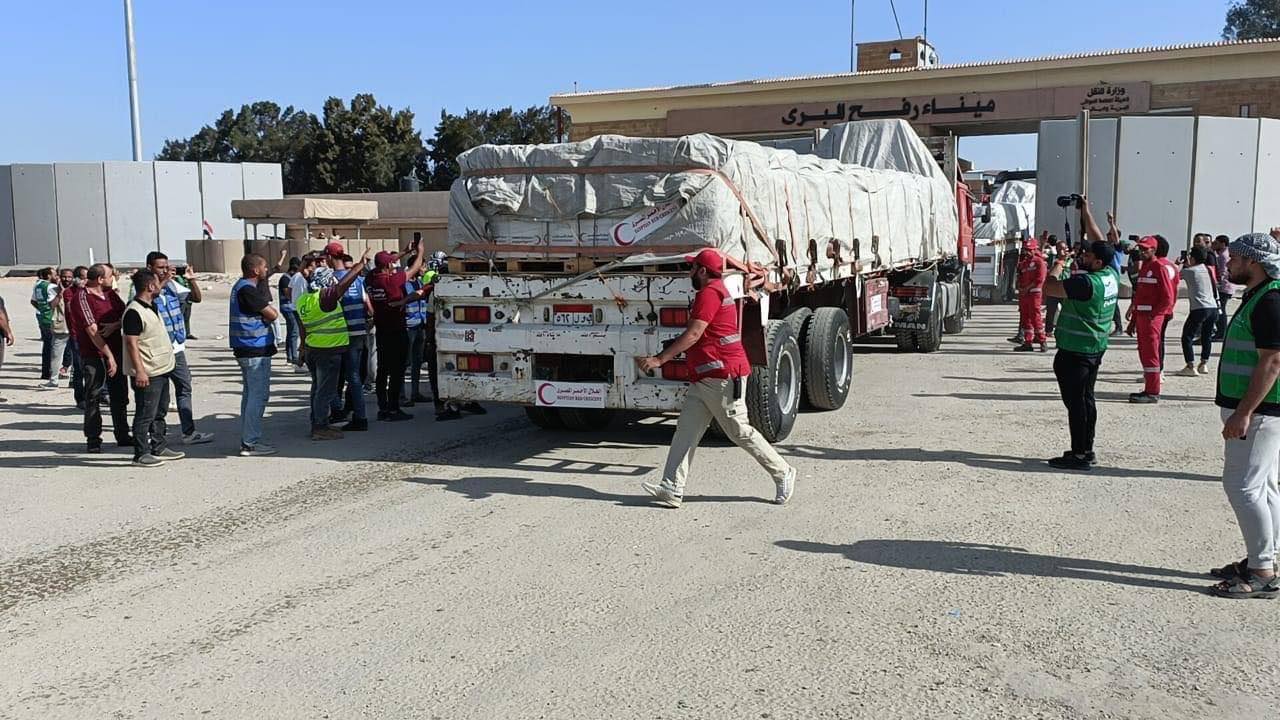Sunday has been described by Palestinians on the ground as the worst night since the start of the Israeli aggression, with at least 60 killed overnight alone.
A second humanitarian convoy crossed from Egypt into the besieged Gaza Strip on Sunday, authorities confirmed, as Israel’s relentless bombardment on the enclave killed at least 55 Palestinians overnight.
Some 17 additional trucks made their way into Gaza on Sunday, following a convoy of 20 trucks that brought essential medical supplies, food, and water into the besieged area the previous day.
That came as a shelling struck an Egyptian post located near the border with the Gaza Strip that was quickly downplayed as an “accident” by the Israeli military.
Several Egyptian border guards suffered injuries from the fragments of the Israeli tank shelling, the Egyptian army confirmed. According to an observer and a medical insider, seven individuals were injured in the incident and subsequently transported to a medical facility.
Across the borer, Gaza is facing a dire humanitarian crisis due to a relentless Israeli bombing campaign and its ongoing siege of the Strip.
As it stands, Israel has cut off all access to food, water, and electricity and has allowed just 37 aid trucks into the area through the Rafah crossing with Egypt over the last few days – none of which contain fuel to keep hospitals running.
Israel has launched ongoing deadly airstrikes one Gaza on 7 October following its declaration of war.
Reporting directly from Khan Younis in Gaza, Al Jazeera journalist Hani Abu Isheba said the latest convoy primarily carries critically needed medical aid. Hospitals in Gaza have been grappling with a dire shortage of medical supplies, and there is growing concern about the lack of fuel for generators.
“Doctors are telling us that the aid is meant for hospitals in the Gaza Strip which are in dire need of medical supplies. No fuel has been reported on these trucks,” he said, adding that hospitals are concerned about the lack of fuel.
Speaking to Al Jazeera from Gaza, Thomas White of the United Nations Relief and Works Agency for Palestine Refugees (UNRWA) also raised the alarm.
“No fuel is coming into Gaza. Fuel is really critical now, we need it coming in to keep aid operations going,” he said.
Meanwhile, aid agencies have continued to stress the need for consistent supply deliveries, as the current efforts are deemed “only a drop in the ocean” and are far from meeting the substantial needs of Gaza’s 2.3 million residents.
The humanitarian situation in the densely populated region is becoming increasingly dire, with shortages not only in medical supplies but also in food and drinking water. The Israeli regime’s cuts to electricity, fuel, and water supplies have exacerbated the war on Palestinians and come in parallel to some of its deadliest attacks in decades.
The UN has reported significant damage to sanitation facilities, water wells, reservoirs, and pumping stations due to Israel’s ongoing massacre. The global bloc estimates that approximately 100 trucks are required daily.
Cindy McCain, the executive director of the World Food Programme, emphasised the urgency of the situation, telling Al Jazeera: “We’ve got to get more trucks in”.
She also stressed the importance of ensuring aid reaches the intended beneficiaries safely and on a sustained basis.
This comes as the office of the regime’s Prime Minister Benjamin Netanyahu said Tel Aviv will not allow aid into Gaza and will prevent the entry of aid from other countries that is sent without oversight.
Meanwhile, over 400 Palestinians have lost their lives in the Gaza Strip due to Israeli airstrikes over the past 24 hours, as per the Palestinian health authorities.
A significant portion of these deaths, around 60 people, occurred during overnight attacks. Residential areas in Gaza, including the densely populated Jabalia refugee camp and areas near Gaza’s Al-Shifa and Al-Quds hospitals, were subjected to bombardment by Israel.
A doctor at Al Aqsa hospital in Gaza said 65% of the victims taken to hospital overnight were children.
The late night bombings in various locations in the besieged enclave on Sunday were considered the ‘bloodiest night’ for Gaza since the Israeli war on Palestine, Al Jazeera’s Tareq Abu Azzoum reported.
Israeli offensives in Gaza have led to a devastating toll, claiming the lives of no less than 4,651 Palestinians since 7 October, including at least 1,765 children.
Gaza’s dire conditions are expected to worsen as Israel vows to deepen its bombardment of the Strip ahead of its ground invasion.
Meanwhile, Israel has continued to renew threats to Palestinians and has ordered them to flee to the south of Gaza, despite previously bombings convoys that heeded such calls over the last two weeks.
At the same time, the occupation state has carried out deadly attacks and raids in the occupied West Bank, arresting at least 120 there.







